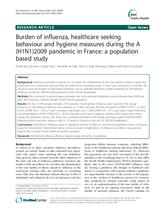BACKGROUND: Influenza surveillance systems do not allow the identification of the true burden of illness caused by influenza in the community because they are restricted to consulting cases. A study was conducted to estimate the incidence and the burden of self-defined influenza, and to describe healthcare seeking behavior for self-defined influenza during the A(H1N1)2009 pandemic in the French population.
METHODS: We conducted a random-based retrospective cross-sectional telephone survey between May 2009 and April 2010 among a random sample of the French population.
RESULTS: For the 10 076 people included, 107 episodes of self-defined influenza were reported. The annual incidence of self-defined influenza was estimated at 13 942 cases per 100 000 inhabitants (CI95% 10 947 - 16 961), 62.1% (CI95% 50.5 - 72.5) of cases consulted a physician and 11.3% (CI95% 5.5 - 21.7) used a face mask. Following recommendations, 37.5% (CI95% 35.5 - 39.5) of people in the survey reported washing their hands more often during the pandemic season, and there was a positive association with being vaccinated against A(H1N1)2009 influenza, being a women, being a child (< 15 years) or living in a big city (≥ 100 000 inhabitants).
CONCLUSIONS: Self-defined influenza causes a significant burden of illness in the French population and is a frequent cause for consultation. These results allow a more accurate interpretation of influenza surveillance data and an opportunity to adapt future health education messages.



